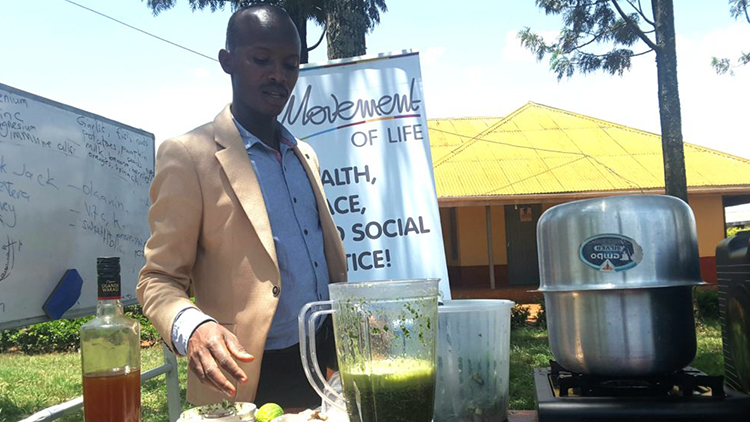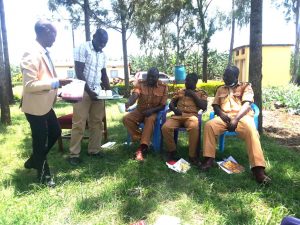- Have any questions? Contact us!
- info@dr-rath-foundation.org

Moderna’s Profits Show Why Big Pharma Can’t Meet Our Health Needs
March 16, 2022
UK Asbestos Maker Withheld Information On Material’s Risks, Court Papers Show
March 20, 2022Using The Scientific Principles Of Cellular Medicine To Improve The Health, Behavior, And Future Economic Livelihoods Of Prisoners In Uganda

Building on the success of their groundbreaking school and community gardening projects, our Movement of Life Uganda team has recently started working with the Uganda Prisons Service in the Isingiro District Government Prison. Teaching the scientific principles of Cellular Medicine, and gardening skills such as making natural compost and organic pesticides, the project will show prison service staff how to grow fruit trees, vegetables, and medicinal plants in order to help prisoners improve their health. Cutting-edge studies prove that not only does the provision of vitamin-rich nutrition benefit overall physical health, but also prisoner behavior.
Many of the challenges faced by the Uganda Prisons Service will be familiar to their counterparts in richer, industrialized countries. Overcrowding is rife, for example, with the total number of prisoners estimated to be more than three and half times higher than the country’s facilities can comfortably hold. This inevitably has a negative effect on not just the physical and mental health of inmates, but that of the prison staff as well. The knock-on effects make the task of reforming and rehabilitating prisoners even harder. Dealing with these challenges results in scarce financial resources becoming stretched to breaking point. The new project with the Uganda Prisons Service therefore aims to address some of these issues.
Benefits for all of society
Reflecting the Movement of Life’s core values of ‘Food for All’ and ‘Health for All’, by June 2020 our projects in Uganda were estimated to be benefitting more than 100,000 people. Not only had thousands of vitamin-rich fruit trees been planted, but inspired by our ‘Work for All’ campaign people were increasingly learning they could also improve their incomes by selling their surplus produce. Some families have even begun setting up coffee plantations and other small agricultural businesses. In this way, they are simultaneously benefitting both their health and the family finances.
Watching these changes, the Movement of Life Uganda team soon realized that, if utilized in a prison setting, such approaches have the potential to transform the health and future economic livelihoods of prisoners. For the reform and rehabilitation of prisoners to be successful, they need to be taught skills that can be used to earn a living. Without such skills, prisoners will always be at risk of reoffending, returning to prison, and adding to overcrowding. Fruit and vegetable gardening thus offers a promising route towards reform and rehabilitation.

Training session for prison officers at Isingiro District Government Prison, Uganda
A further potential benefit of prison fruit and vegetable gardens addresses the fact that mental disorders, especially depression, are known to be common in Ugandan prisons, and that vitamin-rich diets can prevent depression. Micronutrients such as omega-3 fatty acids, magnesium, and B vitamins have been scientifically shown to help control depression.
There are also potential benefits for the behavior of prisoners. In recent years, research conducted independently in several countries has produced convincing evidence that a poor diet containing a low intake of micronutrients may be a causal factor in antisocial behavior. Opening up the possibility of a fundamentally new approach to reducing violent and aggressive behavior, it suggests that by correcting micronutrient deficiencies in prisons such conduct can be improved.
A UK study published in 2002 is one of the landmark pieces of research in this area, finding clear evidence of a link between dietary intake and violent behavior in a well-designed trial that gave nutritional supplements to prisoners. During the study the subjects who received the micronutrients committed 37 percent fewer violent offences and 26 percent fewer offences overall, whereas the rates of disciplinary incidents remained substantially unchanged for those receiving placebos. A double blind, placebo-controlled, randomized trial, the research attracted an extremely favorable response from the academic community for the high standard of its methodology. As a result of this and subsequent work, the role that nutrition can potentially play in shaping social behavior – both in prisons and in the wider community – is becoming increasingly apparent.
It is important that prisoners pay their debt to society. But punishment alone will not guarantee their reform and rehabilitation. While some people may consider poor diets and overcrowding to be appropriate punishment for offenders, evidence suggests the byproducts of such hardships ultimately simply increase the financial costs faced by taxpayers. It is therefore in everyone’s interests for the health and behavior of prisoners to be improved, and to ensure that upon release they avoid reoffending and are able to contribute positively to the economy. With this goal in mind, we commend the Uganda Prisons Service for their participation in this innovative gardening project and look forward with great interest to monitoring the results.



